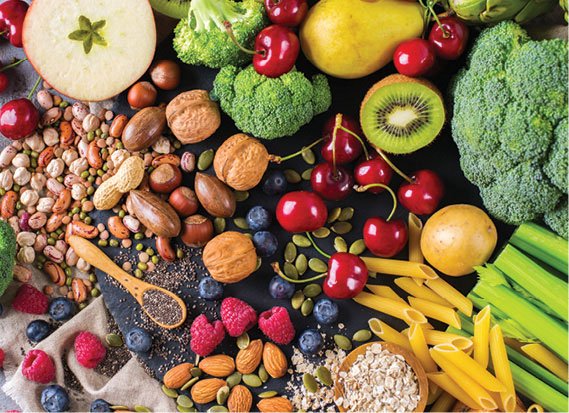3 Effective Ways to Boost Your Digestive Health

When you think about getting your gut in shape, do you imagine yourself doing countless crunches or other core exercises? While regular exercise can help you keep your waist (and weight) in check, paying attention to gut bacteria—also called the microbiota or microbiome—can also help. Emerging research suggests making certain diet and lifestyle choices can nourish gut bacteria and potentially improve your health.
Erica Sonnenburg, Ph.D.—a senior research scientist at Stanford University and co-author of The Good Gut: Taking Control of Your Weight, Your Mood, and Your Long-Term Health—says dietary changes, excessive antibiotic use and over-sterilization have wreaked havoc on our guts, contributing to the loss of gut bacteria, which is necessary for boosting immunity and supporting a healthy metabolism. That, in turn, has made us more vulnerable to obesity and other conditions. Fortunately, it is possible to improve the amount and types of gut bacteria you ingest to enhance your microbiota. Here’s how
Get your fill of fiber.
Because gut bacteria thrive on dietary fiber, Sonnenburg says it’s vital to eat a variety of fiber-rich vegetables, fruits, legumes, nuts, seeds and whole grains. “Think of your microbiota as an internal garden and dietary fiber as fertilizer for that garden,” she says. “If you add a lot of fertilizer, you will get a diverse, lush garden. But if you don’t, the garden will start to resemble a barren, weedy landscape.
To boost intake, have fresh fruit, oatmeal with berries or pearled barley for breakfast. Later in the day, snack on whole-grain crackers with hummus or guacamole, or grab a handful of nuts and seeds. Make vegetable- and bean-based soups the focus of mealtimes. Gradually incorporate plants into your diet while drinking extra water to ease the passage of dietary fiber through your body.
Consider fermented foods.
Sonnenburg recommends eating fermented foods like yogurt, kimchee, sauerkraut, kefir and miso to provide your body with good bacteria. To boost your intake, top plain, unsweetened yogurt (with “live and active cultures”) with fresh berries or nuts. Add kefir, a fermented milk drink, to smoothies, or, like Sonnenburg, use it to make salad dressing. Eat raw sauerkraut as a side dish or use it atop eggs, salads and sandwiches. Use miso, a thick Japanese paste made from fermented soybeans, as a base for sauces or salad dressings, or add it to vegetable soups or tofu dishes. Sonnenburg adds kimchi, a spicy Korean dish made from fermented cabbage, to eggs, puts it in bean quesadillas, and uses it on meat or veggie burgers. Add fermented foods to your diet gradually and in small portions to minimize bloating, gas and other side effects.
Get dirty.
Sonnenburg warns against going overboard when it comes to sanitizing. Although she advocates washing hands before meals, she suggests getting rid of all antibacterial soaps and cleaners. “There’s no evidence they prevent disease any more than regular soap, and they may reduce your exposure to good bacteria and contribute to resistant bacteria,” she says. Sonnenburg also loves pets. “Getting—or at least playing with—a pet not only benefits you psychologically, but it’s a wonderful way to expose yourself to more bacteria.”